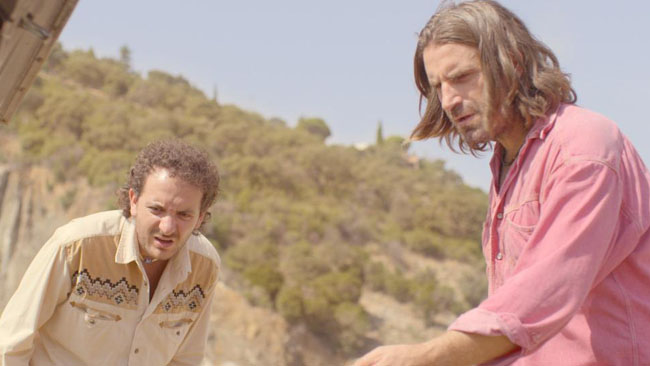
Mandibles
directed by Quentin Dupieux
starring Grégoire Ludig, David Marsais, Adèle Exarchopoulos
Magnolia Pictures
Earlier this month, here on Ink 19, I enthusiastically reviewed director Quentin Dupieux’s 2018 surrealist crime comedy, Au Poste! (Keep An Eye Out), a film that had finally received a full release in the U.S. years after its French debut. Though I had capsule-reviewed Dupieux’s 2019 film, Deerskin, for our AFI Fest coverage that year, my lengthy piece on Au Poste! gave me a greater opportunity to explain in detail my affection for Dupieux’s work, affection that has grown stronger in the last decade as I’ve watched him progress as a filmmaker following his third feature about a tire turned killer, Rubber.
My piece on Au Poste!, a film which bears similar themes to the 1979 feature by Bertand Blier, Buffet froid, also allowed me the opportunity to confirm my long-held position that Dupieux has become the heir apparent to the great Blier, who like Dupieux, had taken an even more surreal and ridiculous approach to comedy than Buñuel had done before him. If you have been watching Dupieux’s work over this last decade, but are unfamiliar with Blier, all you need to see is the scene from Blier’s underrated 1976 sex comedy, Calmos, where the miniature versions of actors Jean-Pierre Marielle and Jean Rochefort hang glide into a vagina to sense that Blier and Dupieux are audacious, kindred spirits with absolutely zero restraint between them.
Though Dupieux fans in the States had to wait three years to see Au Poste!, his newest dark comedy, Mandibles (Mandibules), which premiered at Venice last fall, was shown as part of the Rendez-Vous with French Cinema festival that was held virtually this month through Films at Lincoln Center. In a conversation with programmer Dan Sullivan that followed the screening at the festival, Dupieux described Mandibles as his first “positive film” with an elevator-pitch of “E.T. meets Dumb and Dumber,” but since I am fixated on this “Dupieux is the next Blier” rap, I think that it is fair to say that Mandibles is actually more like, “E.T. meets Blier’s Les Valseuses (Going Places),” but with a lot less sex than Blier’s notorious 1974 film. Actually, there is no sex at all in Mandibles, but all of the cluelessness, random violence, and whimsical theft exhibited by Jean-Claude and Pierrot in Les Valseuses are on full display in Mandibles via its anti-heroes, Manu and Jean-Gab. As for a creature like E.T. in Mandibles, you get an entity that is less glowing and sweet than Spielberg’s extraterrestrial, and something that is more in line with the economic status of its downtrodden rescuers.
Set around a small beach community in the South of France, Mandibles is a caper story centered on lifelong downtrodden friends in their 30s, Manu and Jean-Gab, who are portrayed to slack perfection by Grégoire Ludig and David Marsais, who are known in France mainly through their long-running sketch-comedy television program, Palmashow. In short form, visually and philosophically, Manu and Jean-Gab are that perfect personification of a tourist destination that is only frequented during the summer months and mostly abandoned for the rest of the year. As a tourist, you gleefully go to an idyllic spot for your yearly vacation, and although your life has progressed in that time since you last visited, the place you return to every year has eerily remained the same.
As the film opens, we find the homeless Manu comfortably asleep on the beach where he is awakened by a friend who offers Manu a seemingly easy mission that could put 500 Euros into his empty pockets. This possibly nefarious assignment is of course the classic cinematic setup of picking up a thing from a guy and giving that thing to another guy fifteen miles away for the loot, but there is just one snag…Manu has no car to do the drop. To fix his transportation issue, Manu simply hot-wires a junked Mercedes he finds unlocked and is now clear to start his task, but before he can do this achingly easy job, he must pick up his friend Jean-Gab, who is lazily attending to his mother’s shabby gas station. After laying the assignment on Jean-Gab, Manu and his best friend share a secret horned-fingered handshake that is combined with the exclamation of “toro,” and they are now off to do the job…
Driving down the road to their destination, Manu and Jean-Gab hear a loud buzzing coming from the trunk of the car, which they first deduce as the sound from a hair dryer. Yes, that is who we are dealing with here. Unfazed, the pair shrugs off the noise, but after a few repeats, they stop and find inside of their trunk a docile housefly that is the size of a three year old child. Only slightly spooked, Jean-Gab doesn’t panic, and quickly he imagines a future where they will train this fly to rob banks for them. This plan is not a hard sell for Manu, who then plots out a location where they can train their new accomplice in the art of fetching cash. Of course, just going down the road to finish the job they set out to do is not even an option at this point, so the pair forcibly evicts an old man from his dilapidated trailer to serve as Jean-Gab’s and Manu’s makeshift fly school. Unsurprisingly, the former owner of the trailer did not stock enough food in his fridge to feed two men and a giant fly, so in true Jean-Claude and Pierrot fashion, Jean-Gab and Manu take the gun that they found in their newly acquired trailer and relieve a local nebbish of all of his groceries.
Once back at home with supplies in hand, Jean-Gab begins training his fly, and Manu cooks a meal for them all, but as uncooked food needs fire and a chef with some commonsense, Manu accidentally sets ablaze their new insect training center, which forces our beat trio to find shelter elsewhere. With no gas in their Mercedes (I guess that getting petrol at Jean-Gab’s mother’s gas station required too much foresight), Jean-Gab and Manu must tow their car with the unicorn bicycle that managed to survive the fire.
On the road with no place to go, they get picked up by a young woman named Cécile (India Hair) and her carload of posh friends and family who offer Jean-Gab and Manu a place to stay after Cécile mistakes Manu for an ex-lover of hers from school. Having no other choice for a home base, Manu plays the role of the boy who had tryst with Cécile, so they can all settle down in their new comfortable digs, but he and Jean-Gab must hide Dominique, their newly named fly, from everyone, but especially Agnès, (a grandiose over-the-top supporting performance from Adèle Exarchopoulos) a well-to-do woman who is afflicted with a consistently full volumed speaking voice due to a ski accident. Lacking any social graces of her own, Agnès is also equipped with an abnormally heightened sense of suspicion with the bonus added feature of a 24/7 need to define class prerogatives and manners to the new houseguests. Though Jean-Gab and Manu must lie to everyone in order to hide Dominique, they are polite when confronted by Agnès and offer frank insights into their own poor upbringing and apologies for their consequent lack of refinement. As Agnès continues to boorishly lash out about manners, Dominique ostensibly becomes less repulsive and even borderline adorable through her infant-like cackles and overall calmness.
There is a lot going on in the compact seventy-seven minutes running time of Mandibles. The film succeeds beyond just the fun and positive experience that Dupieux had hoped to create, and the humor is as inventive, funny, and surreal as it was in his previous effort, Deerskin. In addition, Mandibles draws another similarity to Deerskin in how it builds on an interesting point about the ways that friendships are formed and sustained within economic lines, and like Les Valseuses did forty-five years ago, the insertion of the extreme in both films provides an excellent diversion that allows you to personally discover the class and cultural observations that lie underneath the madness.
Sure, I admit that this might seem like an exceedingly pretentious read on a slacker comedy about a cute giant fly and a couple of hapless deadbeats, but Dupieux deserves a lot of credit for his ability to address issues of class and privilege while never pulling you too far away from the strong friendship between Jean-Gab and Manu, and their new buddy, Dominique. With its distinctively Dupieux blend of sweet, bizarre, and comedic, Mandibles highlights the bedrocks of friendship, time together and unconditional love, which ultimately allow Jean-Gab, Manu, and Dominique to move forward in their lives as a united trio, a unit far stronger than their individual spirals to nowhere when apart.












